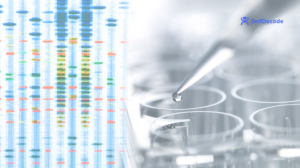What if the secret to finding the right medication – at the right dose, with minimal side effects – was already written in your DNA?
For decades, medicine has operated on trial-and-error: prescribe a standard drug, wait to see if it works, adjust if it doesn’t, and hope the side effects aren’t too severe. But what works for one patient might be ineffective or even dangerous for another. The difference? Your genes.
Gene testing for medication is revolutionizing how we approach treatment, transforming healthcare from a one-size-fits-all model into a precision-guided system tailored to your unique genetic makeup.
Introduction to Gene Testing for Medication
Definition and Overview
Gene testing for medication, also called pharmacogenomic testing, analyzes your DNA to predict how your body will respond to specific drugs. A genetic test examines variations in genes that control drug metabolism, efficacy, and safety. These genetic variations affect everything from how quickly your liver breaks down a medication to whether a drug will even reach its intended target in your body.
By identifying these variations before prescribing treatment, healthcare providers can make informed decisions that maximize benefits while minimizing risks. This approach represents a fundamental shift in how we think about medication – moving from population averages to individualized treatment plans based on your genetic makeup.
Historical Context
The journey toward personalized medicine through genetic testing began in the 1950s when scientists first discovered that genetic differences affected drug responses. The real breakthrough came with the completion of the Human Genome Project in 2003, which mapped all human genes and opened the door to understanding how genetic variations influence health and treatment.
Early pharmacogenomic testing focused on single drugs with known genetic interactions. As technology advanced and costs plummeted, genetic testing evolved from a research curiosity into a clinical tool. Today, the FDA recognizes hundreds of pharmacogenomic biomarkers in drug labeling, guiding physicians toward safer, more effective prescribing practices.
Importance in Modern Medicine
Modern medicine faces a critical problem: approximately 30-50% of patients don’t respond to their first prescribed medication for conditions like depression, chronic pain, or cardiovascular disease. Even worse, adverse drug reactions send millions to emergency rooms annually and represent a leading cause of hospitalization.
Gene testing for medication addresses these challenges head-on. By analyzing a patient’s genetic profile, healthcare providers can skip medications likely to be ineffective based on genetic makeup, avoid drugs that pose elevated risk for potential side effects, optimize dosages from the start, and reduce the time and frustration of finding effective treatments.
The Science Behind Gene Testing
How Genes Affect Drug Metabolism
Your body treats medication like any foreign substance: it needs to process it, use it, and eventually eliminate it. Genes encode enzymes that break down medications in your liver and other organs. Some people inherit “fast metabolizer” versions of these enzymes, clearing drugs quickly and potentially needing higher doses. Others have “slow metabolizer” variants, meaning standard doses might accumulate to dangerous levels.
The cytochrome P450 family of enzymes, encoded by CYP genes, handles metabolism of roughly 75% of all medications. Genetic variations in just one gene – CYP2D6 – affect how your body processes over 100 common drugs, including antidepressants, pain medications, and heart drugs. Your genetic variation in this single gene could mean the difference between a medication saving your life or causing a medical emergency.
Pharmacogenomics Explained
Pharmacogenomics merges pharmacology (the study of drugs) and genomics (the study of genes). It examines how your entire genetic profile influences your response to medications, creating a comprehensive picture of drug-gene interactions.
This field has revealed that medication response isn’t just about metabolism. Genetic testing identifies variations that affect drug targets (whether medications can properly bind to receptors), drug transport (how efficiently medications move through cell membranes), immune response (whether you’ll develop allergic reactions), and disease mechanisms (how genetic disorders alter drug effectiveness).
Studies in pharmacogenomics have transformed treatment for conditions ranging from cancer to mental health. For breast cancer, pharmacogenomic testing determines whether tamoxifen will work based on CYP2D6 status. For patients requiring anticoagulation, genetic tests guide warfarin dosing to prevent dangerous bleeding or ineffective treatment.
Key Genes Involved in Drug Response
While thousands of genes potentially influence medication response, several deserve special attention:
CYP2D6 and CYP2C19 process antidepressants, pain medications, antiplatelet drugs, and proton pump inhibitors. Test results revealing your metabolizer status can prevent treatment failures and dangerous side effects.
VKORC1 and CYP2C9 determine how you’ll respond to warfarin, a blood thinner where dosing errors can cause life-threatening bleeding or stroke. Pharmacogenomic testing for these markers has become standard practice in many medical conditions requiring anticoagulation.
TPMT and NUDT15 affect how you process thiopurine drugs used in autoimmune diseases and cancer. Certain genetic variations dramatically increase toxicity risk, making genetic testing essential before starting treatment.
HLA-B predicts severe allergic reactions to medications like carbamazepine and abacavir. A simple genetic test can prevent potentially fatal hypersensitivity reactions.
Types of Gene Testing for Medication
Single-Gene Testing
Single-gene testing examines one specific gene known to affect a particular medication or drug class. Healthcare providers typically order this targeted approach when prescribing medications with well-established gene-drug interactions.
For example, before starting carbamazepine for seizures, a physician might order HLA-B*15:02 testing in patients of Asian descent, who face elevated risk for severe skin reactions. The advantage lies in its focused, cost-effective approach for specific clinical situations. However, it provides limited insight compared to broader testing options.
Multi-Gene Panel Testing
Multi-gene panel testing analyzes dozens of genes simultaneously, creating a comprehensive pharmacogenomic profile. This approach examines key genes involved in metabolizing and responding to hundreds of commonly prescribed medications across multiple drug classes.
A typical pharmacogenomic panel might test 10-50 genes, covering medications for mental health, cardiovascular disease, pain management, gastrointestinal conditions, and oncology. SelfDecode’s Medication Check (PGX Testing) offers comprehensive multi-gene panel analysis, providing healthcare providers with actionable genetic information for personalized treatment planning. The beauty of panel testing is that test results remain relevant throughout your lifetime – one test can guide medication decisions for years to come.
Whole Genome Sequencing
Whole genome sequencing represents the most comprehensive approach, reading your entire genetic code. While incredibly detailed, this extensive testing goes far beyond what’s typically needed for medication management. For pharmacogenomics specifically, whole genome sequencing provides more information than healthcare providers currently know how to use clinically.
For most patients seeking to optimize medication treatment, multi-gene panel testing offers the sweet spot of comprehensive coverage without unnecessary complexity.
Process of Gene Testing for Personalized Treatment
Step-by-Step Guide
Getting started with gene testing for medication is simpler than most people expect. The journey begins with a consultation where your healthcare provider assesses whether pharmacogenomic testing makes sense for your situation. Patients who experience adverse reactions to multiple medications, struggle with ineffective treatments, or have family history of drug sensitivities are prime candidates.
Genetic testing requires only a simple sample – usually a cheek swab or saliva collection that takes minutes. Sophisticated genetic testing platforms then examine your DNA for variations in pharmacogenomically relevant genes, typically taking 1-3 weeks.
Laboratories compile findings into comprehensive reports categorizing medications based on your genetic profile. Drugs are typically grouped as “use as directed,” “use with caution,” or “consider alternatives,” along with specific dosing guidance where applicable. Your healthcare provider reviews test results with you, explaining what your genetic variations mean for current and future medication decisions.
Interpretation of Results
Understanding pharmacogenomic test results requires translating genetic variations into clinical action. Reports typically classify drugs into categories:
Normal Metabolizers suggest standard dosing should work as intended. Intermediate or Poor Metabolizers process certain medications more slowly than average, meaning standard doses might accumulate to toxic levels. Rapid or Ultra-Rapid Metabolizers clear specific drugs faster than typical patients, potentially requiring higher doses for effective treatment.
Sophisticated reports provide specific guidance: “Consider 50% dose reduction,” “Monitor for muscle pain,” or “Alternative medication recommended.” Some platforms, like SelfDecode’s comprehensive PGX analysis, integrate genetic testing results with other health data to provide even more nuanced recommendations.
Limitations and Considerations
While pharmacogenomic testing offers tremendous value, it’s not a crystal ball. Genetic testing doesn’t cover every medication or every gene-drug interaction. Many drugs lack sufficient research linking specific genetic variations to clinical outcomes.
Your genes influence but don’t solely determine drug response. Age, weight, liver and kidney function, other medications, diet, and disease state all affect how drugs work. Genetic testing provides crucial information that healthcare providers must integrate with these other factors. Not all gene-drug associations carry equal scientific weight, and reports should indicate confidence levels for different recommendations.
Benefits of Gene Testing in Medication Management
Enhanced Drug Efficacy
Gene testing for medication eliminates the frustrating trial-and-error process that leaves many patients cycling through ineffective medications for months or years. For mental health treatment specifically, pharmacogenomic testing has shown remarkable promise. Studies demonstrate that patients with depression whose treatment incorporates genetic testing achieve remission faster and more reliably than those receiving standard care.
The impact extends across medical conditions. In cardiovascular disease, genetic testing ensures antiplatelet medications like clopidogrel actually activate properly – about 25% of patients carry genetic variations rendering this drug ineffective. For pain management, pharmacogenomic insights help distinguish patients who will benefit from codeine-based medications from those who won’t respond due to genetic variations affecting drug activation.
Reduction of Adverse Drug Reactions
Adverse drug reactions represent a massive healthcare burden, causing over 100,000 deaths annually in the United States alone. Many of these tragic outcomes are preventable with genetic testing.
Pharmacogenomic testing identifies patients at high risk for dangerous side effects before they occur. Consider abacavir, an HIV medication that causes life-threatening hypersensitivity reactions in about 5% of patients – almost exclusively those carrying the HLA-B*57:01 genetic variant. Genetic testing before prescribing has virtually eliminated these reactions.
The same principle applies across medication classes. Genetic testing prevents severe muscle damage from statins in SLCO1B1 variant carriers, dangerous bone marrow suppression from azathioprine in TPMT-deficient patients, and severe skin reactions from carbamazepine in HLA-B*15:02 positive individuals.
Cost-Effectiveness in Healthcare
The economics of pharmacogenomic testing work decisively in favor of genetic testing for many medical conditions and patient populations. Consider the costs of medication inefficacy: repeated physician visits, additional prescriptions as treatments fail, lost work productivity, and progression of undertreated disease.
Healthcare systems implementing pharmacogenomic programs report impressive returns. Studies examining antidepressant treatment found that pharmacogenomic testing reduced overall healthcare costs by 15-25% through faster remission, fewer medication switches, and decreased emergency utilization. Comparing different genetic testing options helps patients and healthcare providers identify the most cost-effective approach for individual circumstances.
Challenges and Considerations
Ethical and Privacy Concerns
Your genetic information represents the most personal data imaginable. While the Genetic Information Nondiscrimination Act (GINA) protects Americans from genetic discrimination in health insurance and employment, gaps remain. GINA doesn’t cover life insurance, disability insurance, or long-term care insurance.
Data security presents another concern. Reputable testing companies employ robust security measures and clear privacy policies, but patients should understand how their genetic information will be used, stored, and protected before testing. Informed consent becomes crucial, ensuring patients understand what pharmacogenomic testing can and cannot reveal.
Accessibility and Cost Issues
Despite decreasing costs, pharmacogenomic testing remains inaccessible to many patients who could benefit. Geographic disparities mean rural patients may lack healthcare providers trained in interpreting pharmacogenomic results. Insurance coverage variability compounds accessibility challenges – some insurers embrace pharmacogenomic testing while others require extensive documentation or deny coverage entirely.
Healthcare provider education remains inconsistent. Many physicians completed training before pharmacogenomics became clinically relevant and lack confidence interpreting test results. Until pharmacogenomic education becomes standard in medical school curricula, this knowledge gap limits testing adoption.
Scientific and Technical Limitations
Pharmacogenomics remains an evolving science with significant unknowns. Many gene-drug interactions lack sufficient research to guide clinical decisions confidently. The complexity of drug response extends beyond single genes – most medications involve multiple metabolic pathways, transport mechanisms, and targets.
Gene-environment interactions add another layer of complexity. Your genetic makeup determines how you metabolize a drug under normal circumstances, but illness, other medications, diet, and lifestyle factors can modify genetic predictions. These limitations don’t negate pharmacogenomic testing’s value – they simply require appropriate humility about what genetic testing can and cannot tell us.
Regulatory and Ethical Implications
Current Guidelines and Recommendations
The FDA maintains comprehensive tables of pharmacogenomic biomarkers in drug labeling that guide healthcare providers about when genetic testing should inform prescribing decisions. These labels fall into categories of varying strength, from explicit requirements to informational guidance.
The Clinical Pharmacogenetics Implementation Consortium (CPIC) publishes detailed guidelines for specific gene-drug pairs, rating evidence quality and providing explicit dosing recommendations based on genetic test results. These guidelines cover dozens of commonly prescribed medications, giving healthcare providers authoritative guidance for integrating pharmacogenomic information into clinical practice.
Balancing Innovation with Patient Safety
The rapid pace of pharmacogenomic discovery creates tension between offering cutting-edge personalized medicine and maintaining rigorous safety standards. This tension plays out in debates about direct-to-consumer pharmacogenomic testing. Should patients access genetic information about drug responses without physician involvement? Balancing patient autonomy with safety concerns remains an ongoing challenge.
As SelfDecode and similar platforms incorporate increasingly sophisticated analysis methods, regulatory frameworks must evolve accordingly to protect safety while accelerating access to promising innovations.
Informed Consent and Privacy
True informed consent for pharmacogenomic testing requires patients to understand not just what the test measures but the potential implications of genetic information. This means discussing the scope of information revealed, how results will affect current treatment and future healthcare, privacy protections and limitations, potential psychological impact, and family implications.
Healthcare providers trained in genomic medicine can navigate these complex conversations, ensuring patients make truly informed decisions about whether pharmacogenomic testing aligns with their values and healthcare goals.
The Future of Personalized Medicine
Emerging Technologies and Innovations
The future of gene testing for medication looks dramatically different from today’s landscape. Rapid point-of-care genetic testing represents one transformative development – imagine pharmacogenomic testing completed in your healthcare provider’s office during a single visit. Emerging technologies using microfluidics and portable sequencing devices could make this vision reality within years.
Multi-omic integration moves beyond DNA sequence alone. Future pharmacogenomic platforms will incorporate RNA expression data, protein levels, metabolite profiles, and microbiome composition. This comprehensive molecular picture captures not just your genetic potential but your current biological state, providing even more precise medication guidance.
Integration into Routine Healthcare
Pharmacogenomic testing is transitioning from specialized tool to standard practice. Forward-thinking healthcare systems are implementing preemptive genotyping programs, testing patients before they need medications and storing genetic information in electronic health records for future reference. When a physician prescribes medication years later, pharmacogenomic guidance appears automatically.
Modern EHR systems increasingly incorporate clinical decision support tools that analyze pharmacogenomic data alongside other patient information. When a healthcare provider orders a medication, alerts flag genetic contraindications or dosing adjustments automatically. Best pharmacogenomics testing companies are competing to make testing more accessible, affordable, and actionable.
The Role of Artificial Intelligence
Artificial intelligence is transforming pharmacogenomics from descriptive science into predictive powerhouse. AI algorithms excel at identifying complex patterns across millions of genetic variations, clinical outcomes, and patient characteristics. Machine learning models trained on large pharmacogenomic datasets can predict drug responses with increasing accuracy, even identifying previously unknown gene-drug relationships.
Rather than categorizing patients into broad groups, AI enables individualized risk assessment. By integrating genetic data with age, weight, kidney function, other medications, and disease characteristics, AI systems generate patient-specific predictions about drug efficacy and safety that account for unique individual circumstances.
The Road Ahead for Personalized Treatment
The trajectory is clear: healthcare is moving inexorably toward personalization, with pharmacogenomics leading the way. Within the next decade, most people will have comprehensive genetic information stored in their health records from birth or early childhood, ready to guide medication decisions throughout life.
Today’s pharmacogenomic testing covers perhaps 10-15% of commonly prescribed medications. As research fills knowledge gaps, genetic guidance will extend to a majority of drugs. Prescribing any medication without considering genetic factors will eventually seem as outdated as ignoring drug allergies.
Understanding what diseases can be detected through genetic testing provides broader context for how genetic information transforms not just medication management but entire approaches to health and disease prevention. Similarly, exploring genetic methylation testing reveals additional layers of biological information that will eventually integrate with pharmacogenomics.
The promise of gene testing for medication represents recognition that each person’s biology is unique and deserves individualized consideration. As pharmacogenomic testing becomes routine and genetic information integrates seamlessly into healthcare decisions, we move closer to medicine’s ultimate goal: giving each patient the right treatment, at the right dose, at the right time.
Your genes have been waiting to tell their pharmacological story. With gene testing for medication, healthcare providers can finally listen – and respond with treatments as unique as your genetic makeup. The era of truly personalized medicine isn’t coming. It’s here.





